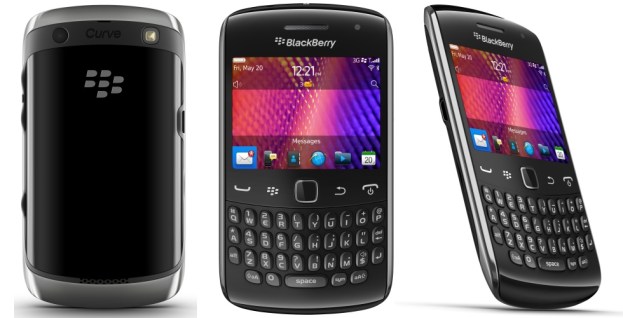
Research In Motion is having a busy August. At the beginning of the month, the smartphone maker debuted three new BlackBerry models, all touch-based, and all equipped with BlackBerry 7 OS, RIM’s newest operating system. Today, the Canadian company squared its new offerings with a fourth new phone, a new BlackBerry Curve. As usual, this one new phone has three complex numbers behind it: it is known as the BlackBerry Curve 9350/9360/9370, depending on what carrier you buy it on. Sadly, unlike the other three BB 7 OS smartphones, this one has no touch capabilities.
For the most part, the new Curve is pretty standard, offering slight upgrades to its model line, which has been running for years. The new phone has a thinner and more metallic frame, a staple of RIM’s newest offerings. Other features include a 5MP rear camera, an NFC chip (though there’s no real way to use it yet), 2.44-inch HVGA+ display with a 480×360 resolution, 512MB of internal storage, a MicroSD card slot, and GPS. The unit will come in CDMA, GSM, and HSPA varieties, meaning it can launch on Verizon/Sprint as well as AT&T/T-Mobile.
Strangely, most of RIM’s press release doesn’t discuss the new Curve at all. A majority of the words generically discuss the new operating system, which is built for touch (though this phone doesn’t have it) and sports a browser that is supposedly better than the lousy Web browser on older BlackBerries. New versions of RIM’s BlackBerry Messenger and Social Feeds applications were recently released as well.

So, will this phone get you to switch to BlackBerry? Will it get you to stay?
Editors' Recommendations
- BlackBerry trailer depicts the rise and fall of the iconic phone
- BlackBerry is better off dead
- A new BlackBerry with a keyboard is still on the schedule for 2022
- BlackBerry rises from the grave: New 5G phone with a keyboard coming in 2021
- TCL won’t make BlackBerry phones anymore, sending the brand back into limbo


